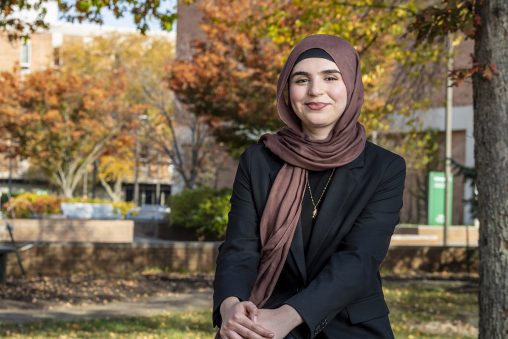
Marwah Almuzoughi, an international studies and political science major at Wright State, says serving as president of the Student Government Association allows her to give back to the community. (Photo by Erin Pence)
Marwah Almuzoughi, the president of Wright State University’s Student Government Association, is not a typical student nor with a typical background.
Almuzoughi arrived in the United States not speaking English, but Arabic, and after having felt her house shake from bombs dropped in a war in her home country of Libya. And after her father was kidnapped, threatened with death, but freed.
Yet, here she is, on track to graduate from Wright State next spring and on the threshold of law school, through which she hopes to help other young girls who experience what she has experienced.
Almuzoughi majors in international studies, with a concentration in international diplomacy and peace studies, and political science.
Her role with the Student Government Association is her latest, and most significant, campus activity. She has also served on the Provost’s Student Leadership Council, the Model United Nations program, as an orientation ambassador, a First Weekend leader and president of the Muslim Student Association.
“I always wanted to be involved with SGA, but I was hesitant,” Almuzoughi said. “It’s a larger responsibility to represent all the students on our campus.”
She forged ahead, won the election and took office this semester.
“I came in with certain ideas, like, I wanted to advocate for better food,” she said. “But my approach shifted, and the primary focus became building relationships with students and finding out what they need.”
She said the Student Government officers have been proactive, interacting with students in small groups. SGA involvement has been good for her.
“It’s a way where I can give something back to the community,” Almuzoughi said. “It fuels me, keeps me going. It makes me feel like I’m part of a larger thing instead of being a single student.”
Almuzoughi arrived in Dayton in 2015 as a 13-year-old. Her family had arrived from Tripoli, Libya, in the wake of that country’s civil war.
She entered junior high school, where “the students and teacher were nice to me, but I felt isolated as I was the only one in my school who wore a hijab and spoke Arabic,” she wrote in a profile for the Dayton International Peace Museum last year. “It was a challenging time, but I remembered everything I had survived in Libya. I had been given another chance in life for a reason.”
She and her family survived danger and tension in Libya, during the armed conflict between forces loyal to Col. Muammar Gaddafi and the rebel groups that were seeking to oust his government. Members of NATO joined in, bombing Gaddafi’s headquarters. Almuzoughi’s house, which was near Gaddafi’s headquarters, shook from the blasts. It was a scary time, she said.
“In the power vacuum left after the regime change, there was still a lot of unrest,” Almuzoughi wrote.
Her father, the general manager of the largest public printing and publishing company in Libya, was “abducted by militia members who wanted to steal money from the company. They were going to kill him because he refused to support them.”
She added, “He returned to us with handcuff marks on his wrists but otherwise unharmed.”
The Almuzoughi family then had the opportunity to move to Ohio, where her father hoped to pursue a doctorate at Wright State. That never developed, but the family built a new life in Dayton. And it became Marwah as the Almuzoughi who enrolled at Wright State.
She said Wright State has helped her find her voice and her confidence.
“I met Marwah during her first semester at Wright State when she enrolled in one of my courses that is part of the core curriculum,” said Laura Luehrmann, Ph.D., professor of political science and chair of the School of Social Sciences and International Studies. “She quickly impressed me with her insightful questions, and I was pleased when she asked me about ways that she could become more involved across campus.”
Luehrmann added, “Marwah has a knack for bringing people together and organizing them in ways to accomplish great things. She is articulate and assertive, yet humble, and, as a campus community, we have all benefited from her selfless commitment to service.”
After graduation, Almuzoughi plans to apply to law school. Immigration, international law and human rights are on her mind as possible points of focus.
“I’m leaning more toward international policy. A law degree would provide me with an understanding about how things work in that arena,” she said.
She added, “I want to contribute in some way, somehow, as someone who has been affected by war. My end goal is making any contribution that I could possibly make to prevent another young girl from going through what I did.”

 Wright State celebrates homecoming with week-long block party
Wright State celebrates homecoming with week-long block party  Wright State baseball to take on Dayton Flyers at Day Air Ballpark April 15
Wright State baseball to take on Dayton Flyers at Day Air Ballpark April 15  Wright State joins selective U.S. Space Command Academic Engagement Enterprise
Wright State joins selective U.S. Space Command Academic Engagement Enterprise  Glowing grad
Glowing grad  Wright State’s Homecoming Week features block party-inspired events Feb. 4–7 on the Dayton Campus
Wright State’s Homecoming Week features block party-inspired events Feb. 4–7 on the Dayton Campus 